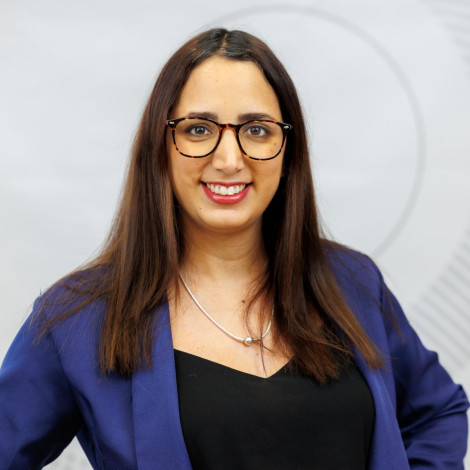
Dr. Leehe Peled-Avron
CV
Positions
2023-present: Lecturer (equivalent to Assistant Professor), Department of Psychology, Bar-Ilan University, Israel.
2020-2022: Postdoctoral fellowship, Department of Psychiatry and Behavioral Sciences, School of Medicine, University of California, San-Francisco (Mentor: Prof. Joshua D. Woolley). Studying the neural correlates of social-cognitive functions in health and psychopathology (affective disorders) using pharmacological (psilocybin) and electrophysiological (EEG\ERP) methods.
2018-2020: Postdoctoral fellowship, Psychology Department, University of Haifa, Israel. (Mentors: Prof. Rachel Tomer and Dr. Roee Admon). Studying neural correlates of social-cognitive functions using pharmaco-imaging (fMRI with methylphenidate) methods in collaboration with the Technion Faculty of Medicine and Rambam medical center Haifa, Israel.
Education
2014-2018: PhD in Neuropsychology (Presidential fellowship for outstanding students, Award for excellent PhD student), Psychology Department, University of Haifa, Israel. (Mentor: Prof. Simone Shamay-Tsoory). Studied brain mechanisms underlying social cognition using electrophysiological (EEG\ERP), endocrinological (oxytocin) and stimulation (tDCS) techniques in health and psychopathology (autism).
2011-2014: M.A. in Clinical Neuropsychology (Magna cum Laude), University of Haifa, Israel.
2008-2011: B.A. in Psychology and English Literature (Magna cum Laude), The Hebrew University of Jerusalem, Israel.
Publications
1. Peled-Avron, L., & Woolley, J. D. (2022). Understanding others through observed touch: neural correlates, developmental aspects, and psychopathology. Current Opinion in Behavioral Sciences, 43, 152-158.
2. Daood, M., Peled-Avron, L., Ben-Hayun, R., Nevat, M., Aharon-Peretz, J., Tomer, R., & Admon, R. (2022). Fronto-striatal connectivity patterns account for the impact of methylphenidate on choice impulsivity among healthy adults. Neuropharmacology, 216, 109190.
3. Saporta, N*., Peled-Avron, L*., Scheele, D., Leibertz, J., Hurlemann, R., Shamay-Tsoory., S.G. (2021). Touched by loneliness – how loneliness impacts the response to observed human touch: a tDCs study. Social cognitive and affective neuroscience, 17(1), 142-150.
4. Peled-Avron, L., Gelbard Goren, H., Brande-Eilat, N., Dorman-Ilan, S., Segev, A., Feffer, K., Gvirts-Problovski, H., Levkovitz, Y., Barnea, Y., Lewis, Y and Tomer, R. (2021). Methylphenidate reduces orienting bias in healthy individuals. Journal of Psychopharmacology, 0269881121996884.
5. Peled-Avron, L., Abu-Akel, A & Shamay-Tsoory, S. G. (2020). Exogenous effects of oxytocin in five psychiatric disorders: a systematic review, meta-analysis, and a personalized approach through the lens of the social salience hypothesis. Neuroscience and Bio-behavioral reviews, 114, 70-95.
6. Peled-Avron, L., Glasner, L., Gvirts, H.Z. & Shamay-Tsoory, S. G. (2019). The role of the inferior frontal gyrus in social touch: a tDCS study. Developmental Cognitive Neuroscience, 35, 115-121.
7. Oren, C., Peled-Avron, L., Shamay-Tsoory, S.G. A scent of romance: Human putative pheromone affects men's sexual cognition. (2019). Accepted for Publication Social, cognitive, affective neuroscience, 14(7), 719-726.
8. Peled-Avron, L., & Shamay-Tsoory, S.G. (2018). Affiliative or aggressive? The role of oxytocin in antisocial behaviour through the lens of the social salience hypothesis. Chapter 13 in the Routledge Handbook of Social Neuroendocrinology edited by – Oliver C. Schultheiss and Pranjal H. Mehta.
9. Peled‐Avron, L., & Shamay‐Tsoory, S. G. (2018). Don't touch me! autistic traits modulate early and late ERP components during visual perception of social touch. Autism Research, 10(6), 1141-1154.
10. Peled-Avron, L*., Goldstein, P*., Yellinek, S*., Weissman-Fogel, I., & Shamay-Tsoory, S. G. (2017). Empathy during consoling touch is modulated by mu-rhythm: An EEG study. Neuropsychologia, 116, 68-74.
11. Peled-Avron, L., Levy-Gigi, E., Richter-Levin, G., Korem, N., & Shamay-Tsoory, S. G. (2016). The role of empathy in the neural responses to observed human social touch. Cognitive, Affective, & Behavioral Neuroscience, 1-12.
12. Peled-Avron, L., Perry, A., & Shamay-Tsoory, S. G. (2016). The effect of oxytocin on the anthropomorphism of touch. Psychoneuroendocrinology, 66, 159-165.
13. Perry, A., Rubinsten, O., Peled, L., & Shamay-Tsoory, S. G. (2013). Don't stand so close to me: A behavioral and ERP study of preferred interpersonal distance. NeuroImage, 83, 761-769.
Research interests
The neural basis of social touch and affective neuroscience
- Working with psychedelic drugs to explore their effect on perception and reaction to social touch and empathy
- The role of social touch in psychotherapy for healthy and clinical populations
- The importance of touch and intimate relations in healthy participants and aversion to social touch in clinical populations such as autism, depression, PTSD (due to assault), schizophrenia, personality disorders and more.
- The effect of interindividual differences in healthy individuals and their effect on social touch (personality, neuroticism, attachment style and more)
Research Achievement
Honors, Prizes & Fellowships
2020-2022: Israel Science Foundation (ISF) Postdoctoral fellowship, 310,000NIS (~88,000$)
2020-2022: Zuckerman- CHE (Council for higher education) Postdoctoral fellowship, 80,000$
2020-2021: Fulbright Postdoctoral fellowship, 47,500$ (declined due to duplicate funding)
2020-2021: American Association of University Women (AAUW) Postdoctoral fellowship, 30,000$ (declined due to duplicate funding)
2018: Joy Ventures Grant, 150,000$.
2017: Yakir award for best PhD student in the Faculty of Social Sciences, University of Haifa, 1500NIS.
Travel Grant, Ministry of Science and Technology, 10,000NIS.
Best poster Award, 2017 annual Eliahu Youdim best poster competition, The Institute of Psychobiology in Israel (NIPI), March, 1500NIS.
2016: Article Publication Award, University of Haifa.
Travel Grant, The Israeli Society of Biological Psychiatry (ISBP) 300NIS.
Travel Grant, University of Haifa.
Travel Grant, The National Institute of Psychobiology in Israel (NIPI) 500$.
2015: Travel Grant, University of Haifa.
2014: Best Poster Award, The18th annual meeting of The Israeli Society of Biological Psychiatry (ISBP), Kibutz HaGoshrim, Israel.
Excellence in Teaching Award, (Fall Semester), Center for Academic excellence, University of Haifa.
Excellence in Teaching Award, (Spring Semester) Center for Academic excellence, University of Haifa.
2013: Research Grant for excellent graduate students, University of Haifa.
2011-2016: The President's Doctoral Scholarship for outstanding students
Media
Public press publications
1. Haifa psychologists suggest why people with autism recoil at physical contact
http://www.jpost.com/HEALTH-SCIENCE/Haifa-psychologists-suggest-why-people-with-autism-recoil-at-physical-contact-499594
2. Scientists now know why people with autism don't like to be touched
https://www.fromthegrapevine.com/health/scientists-now-know-why-people-autism-dont-be-touched
3. Haifa U Study: Autism Spectrum Disorder Sufferers Show Neural Responses of Anxiety on Seeing Social Touch
4. מחקר ישראלי מצא: למה אוטיסטים נרתעים ממגע (Hebrew)
http://www.ynet.co.il/articles/0,7340,L-4980505,00.html
Last Updated Date : 19/01/2025



